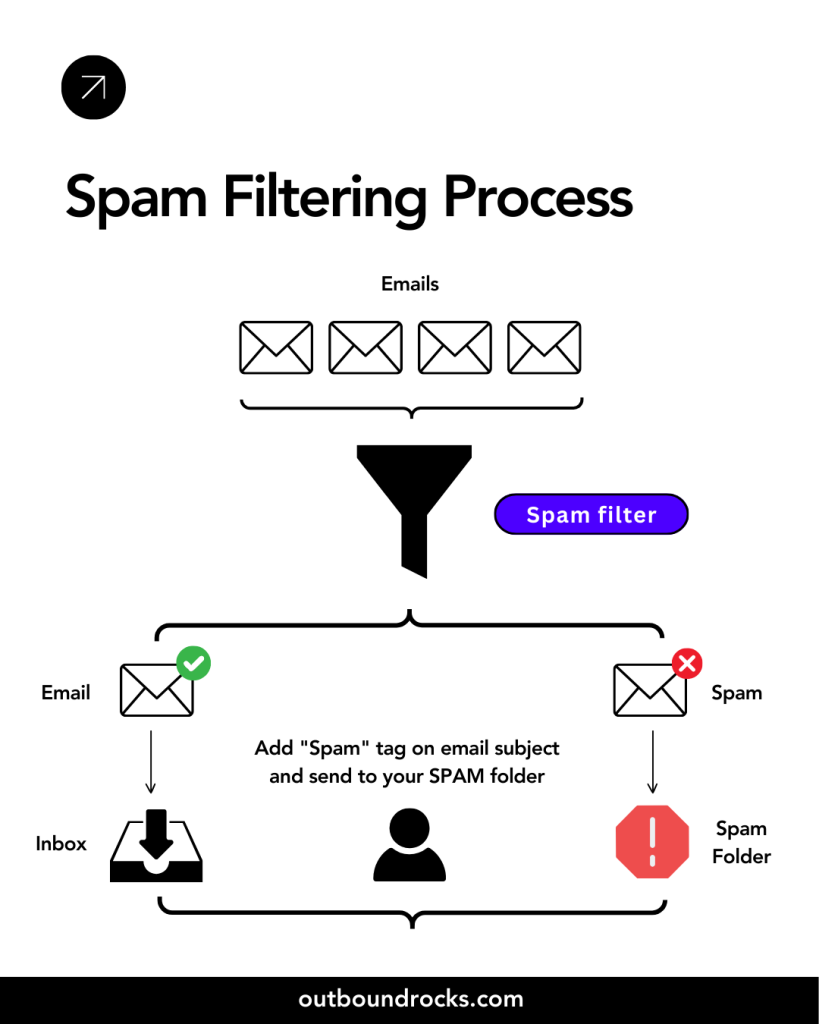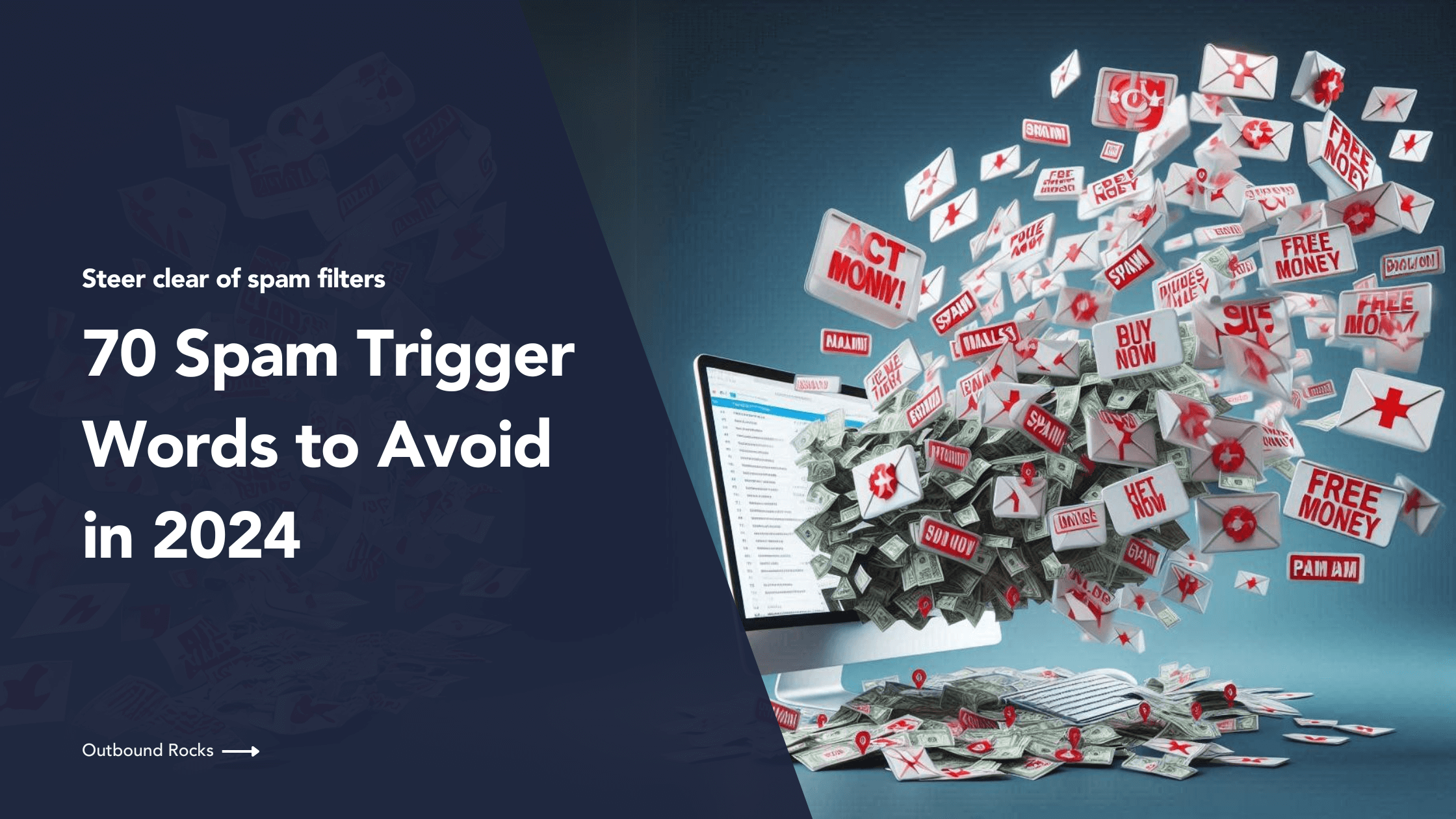Have you ever poured your heart and soul into an email campaign only to see it languish in the dreaded spam folder? You’re not alone.
Spam filters, the gatekeepers of inboxes, are constantly on the lookout for suspicious messages. These filters rely on red-flag words and phrases, known as spam trigger words, to identify unwanted marketing or phishing attempts.
But fear not!
In this article, we will reveal the secrets of spam filters and equip you with a powerful list of 70 spam trigger words to avoid in 2024.
Read on to learn how to craft emails that will bypass spam filters and land directly in your recipients’ inboxes!
TABLE OF CONTENTS
– What are spam trigger words?
– Why should you avoid spam trigger words?
– What are spam filters and how do they work?
– 70 Spam Trigger Words to Avoid in 2024
– Conclusions
What are spam trigger words?
Spam trigger words are basically red flags for email providers. They are words or phrases that typically appear in spam emails and can send your email to the junk folder instead of your inbox.
Examples include words that create a sense of urgency, such as “act now“, or words that make false promises, such as “no risk” or “overnight success“.
It’s important to note that using a few of these words occasionally won’t necessarily trigger spam filters. But relying heavily on them, or using them in a misleading way, can significantly increase your chances of ending up in spam.
For example, using the word “free” in an email is generally acceptable. However, using “free” repeatedly with other terms such as “free bank account” or “free housing” can raise red flags and lead to spam filters.
Why should you avoid spam trigger words?
The primary reason is to ensure that your emails reach the inboxes of their intended recipients. Spam filters are constantly evolving, and they look for these red flags to identify and redirect spam messages.
Using trigger words can increase the chances of your email being flagged and sent to the spam folder, defeating the purpose of sending it in the first place.
Even if your email avoids spam filters, excessive use of trigger words can make your email appear unprofessional or untrustworthy.
For example, recipients who see words like “free miracle cure” or “urgent act now!!!” may be less likely to take your message seriously or even find it offensive.
To learn the best practices for avoiding spam trigger words in your email copy, please click the image below:

What are spam filters and how do they work?
Spam filters are like bouncers for your inbox, constantly checking incoming email to see if it’s legitimate or not. They use a combination of techniques to catch spam before it reaches your precious inbox. Here’s a breakdown of how they work:
Types of spam filters
- Header filters: These detectives examine the email’s header information, which includes the sender’s address, list of recipients, and routing details. They look for suspicious signs, such as a sender address that doesn’t match the domain name or a history of sending spam.
- Content filters: These go through the body of the email and analyze the text for red flags. They look for common spam trigger words (such as “free” or “urgent”) and analyze the overall tone and style of the writing.
- Blacklist filters: Imagine a naughty list of email addresses and domains. Blacklist filters check sender information against constantly updated databases of known spammers. If there’s a match, the email is flagged.
- Authentication filters: These look for specific email authentication protocols such as DKIM and DMARC. These technologies help verify that the email is actually from the sender it claims to be, reducing the risk of spoofing.

70 Spam Trigger Words to Avoid in 2024
Now that you understand how spam filters work and the importance of avoiding spam trigger words, let’s equip you for inbox success. We’ve compiled a list of 70 common spam trigger words to keep on your radar in 2024, categorized for easy reference.
Let’s dive into these groups and the specific words to watch out for:
| Category | List of Words |
| Urgency and scarcity | – Act Now! – Limited Time Offer – Don’t Miss Out! – While Supplies Last – Once in a Lifetime – Act Today Only – Limited Availability – Price Increase Imminent – Stock Running Low – Don’t Delay |
| Exaggerated claims | – Guaranteed – Breakthrough – Miracle – Secret – Scientifically Proven |
| Financial | – Free Money – Get Rich Quick – Earn Big Bucks – Work from Home – Debt Consolidation – Money-back – Financial freedom – Passive income – Make money – High returns |
| Sales | – Buy Now – Click Here – Can’t Miss Offer – Increase Sales – Double Your Income |
| Suspicious sources | – Urgent! – You’ve Been Selected! – Congratulations! – You Won! – Claim Your Prize |
| Phishing | – Update Your Account – Verify Your Information – Click Here to Login – Your Account is at Risk – Urgent Security Alert |
| Overused symbols and text | – ALL CAPS – Excessive Exclamation Points!!!!!!!!! – Free!! Limited Time!!** – $$$$$ – #% off!!! |
| General spammy words | – Amazing – Fantastic – Incredible – Best Price – Unbelievable |
| False promises | – Risk Free – Effortless Income – Overnight Success – Secret Formula – Guaranteed Results |
| Deceptive content | – Confidential Information – Act Now Before It’s Too Late – Unsubscribe Here (placed within body text) – Free Trial (with hidden fees) – You’ve Been Chosen |
| Questionable links and attachments | – Click This Link Now – Download Now – Exclusive Offer (attached) – Important Update (attached) – Verify Your Account (link) |
| Negative emotions | – Shocking Truth – You’re In Danger – Don’t Be Left Out – Limited Spots Available – This Could Change Your Life Forever |
Conclusions
To prevent your emails from being marked as spam, we recommend using the Spam Checker module built into Outbound Rocks.
This module allows you to iterate and make changes to your email until you achieve the best inbox placement.
Try Outbound Rocks for free and see how this feature can take your deliverability to new heights.
Sign up today!
